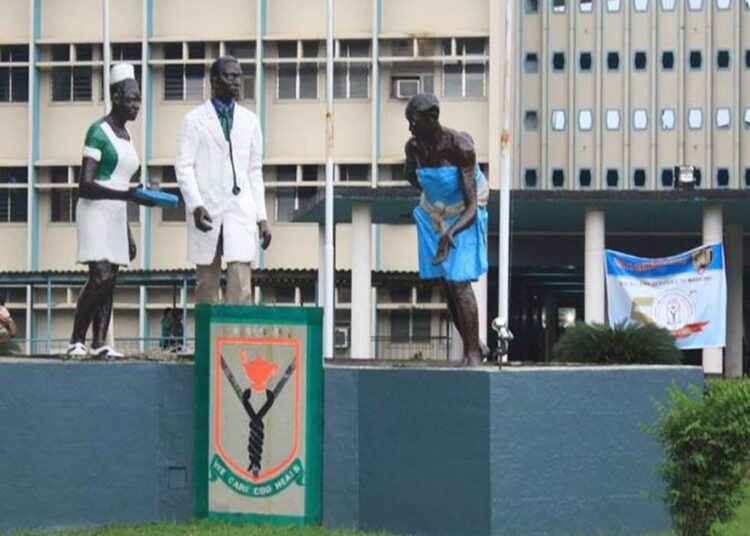An oncologist and consultant pathologist, Dr Abidemi Omonisi, has disclosed that the Lagos University Teaching Hospital (LUTH) reported over 300 cases of childhood cancer in 2013.
Speaking during the Nigeria imPACT Review-Abuja town hall meeting on cancer yesterday, Dr Omonisi expressed concern about the rising number of pediatric cancer cases and stressed the need for increased government attention to combat the trend.
Dr Omonisi, also vice president of the Nigeria Cancer Society and former acting director at the National System of Cancer Registries at the National Institute for Cancer Research and Treatment (NICRAT), highlighted that the government’s current focus is primarily on adult cancers such as breast, cervical, and prostate cancer.
“Children do have cancer, and it is essential for the government and society to realise this,” he emphasised.
Observing a significant shift in the types of childhood cancers, Dr. Omonisi said traditionally, Burkitt lymphoma was the most common pediatric cancer in Nigeria, as documented by the Ibadan Cancer Registry. However, new data from LUTH’s children’s oncology department show a rise in leukaemia cases, marking a shift in the disease landscape.
“The trend is changing, and we now see more haematological cancers like leukaemia, which dominate the centre’s records.
“I was in LUTH last year and did my national assignment there to set up the first-ever child cancer registry for the federal government in the country. And during my consultancy visit, we looked at their data and discovered that the trend has changed.
It’s no longer the Burkitt lymphoma that we’re used to, but what we see now, they see more of a methodological malignancy that we call leukaemia in that centre.
So, the trend is changing, and they have robust data. In short, when I look at their record in their children’s oncology department, the number of cases they’ve seen is more than 300 in a year, more than 300 a year in a single department. Now duplicate that in all the hospitals we have in the country,” Dr Omonisi said.
Speaking on establishing Nigeria’s first population-based childhood cancer registry at LUTH, the expert said that the registry, launched in October 2023, aims to systematically collect and analyse pediatric cancer data.
He said they plan to review the data collected over the past year by December 2024 to understand the most prevalent types of cancers and advise the government accordingly.
“What we’re trying to do now is have robust data to analyse. So, we set up that registry just last year. This October 23rd, we’ll make a year that that registry exists,” he said.
The goal is to expand similar cancer registries across Nigeria’s six geopolitical zones in the next two to three years. Dr Omonisi said these registries will enable better nationwide tracking, analysis, and control of childhood cancers.
In addition to genetic factors, he identified environmental exposures such as infections, diet, and radiation as possible cancer triggers.
Dr Omonisi also stressed the importance of antenatal care and genetic testing for families with a history of cancer, recommending that parents take preventive measures early, even before childbirth.
The expert acknowledged that while Nigeria has improved its cancer control infrastructure by establishing agencies like NICRAT, gaps remain in data collection and resource allocation.
The ongoing collaboration between international organisations, including the International Atomic Energy Agency (IAEA) and the World Health Organization (WHO), is expected to help address these gaps through capacity building and technical support.
Omonisi urged parents to be vigilant and emphasised the need for better public awareness about childhood cancer. “The myth that children don’t get cancer must be dispelled. Early diagnosis and prompt treatment are critical to improving outcomes,” he stressed.
On her part, the IAEA’s team lead, Ilaura Haskins, said the impact review was requested by the minister of state for health, Dr Tunji Alausa, stating that the request came to three UN agencies with technical mandates in cancer control.
“So it’s the IAEA where I work, the WHO, and the International Agency for Research on Cancer.
“Together, the idea is to do a situational analysis of the country’s current capacities and the needs for cancer control. So we know that there is a lot of capacity already in Nigeria. We want to do justice to that and tailor this assessment specifically to the needs of Nigeria.
“In the end, we will submit a final report to the ministry with the situational analysis and recommendations for next steps tailored to Nigeria’s needs, ” she explained.











